- Book publicists
- Editors
- ESL instructors
- Freelance writers
- Literary translators
- Litigation associates
- Marketing coordinators
- News anchors
- Teachers
- Technical writers
English
- Bachelor of Arts
- Minor
- Teacher Certification Content Area
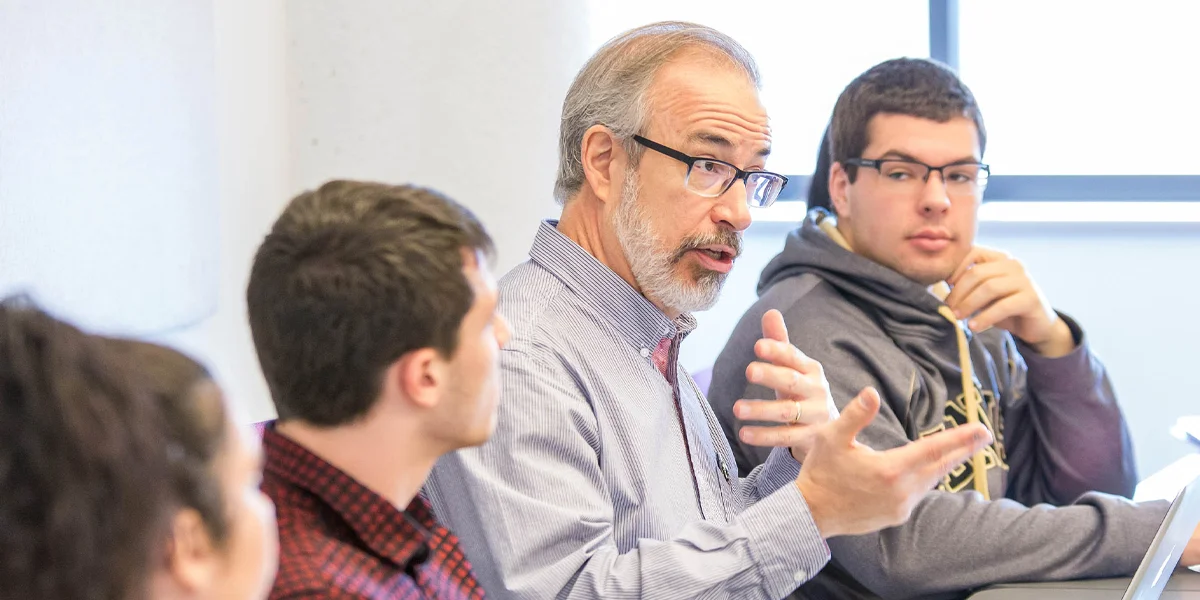
-
In This Section
- Business Administration
- Health and Physical Education
- Sports Management
- Accounting
- Addiction Specialist
- Art History
- Biology
- Biochemistry
- Biological Psychology
- Biotechnology
- Business Data Analytics
- Chemistry
- Education: Children's Literature
- Children's Studies
- Communication and Media Studies
- Computer Science
- Creative Writing
- Criminology, Law, and Society
- Cybersecurity
- Data Science
- Digital Art And Media
- Economics
- Education Degrees and Certificates
- Education: Elementary Education PK-6
- Education: Disability Studies - Special Education
- Education: Secondary Grades Education 7-12
- Engineering
- English
- Entrepreneurship
- Environmental Chemistry
- Environmental Science
- Finance
- Forensic Studies - Financial Investigations
- Forensic Studies - Cybersecurity
- Forensic Studies - Natural Science
- Global Engagement
- Global Security
- Health Science
- History
- Information Systems
- International Business
- International Studies
- Legal Studies
- Liberal Arts
- Literary Translation
- Management
- Marketing
- Mathematics
- Mathematics/Actuarial Science
- Mathematics and Engineering
- Medieval Studies
- Music Studies
- Music Performance
- Management: Operational Excellence
- Peace and Justice Studies
- Philosophy
- Physics
- Political Science
- Psychology
- Public Administration
- Public Health
- Public History
- Public Policy
- Sociology
- Spanish
- Studio Art
- Theology
- The SAP Business One Program
- Explore Undergraduate Degrees
- Undergraduate Programs Schools Index
- Sustainability and Integral Ecology
- Classical Thought
- Sanctity of Life Minor
- Nursing
- Entrepreneurial Success
- Hospitality
- Nonprofit Studies
- Organizational Leadership
- Project Management - Undergraduate
- SAP University Alliance
- Supply Chain
- Aviation Management
- Anthropology
- Data Analytics
- STEM Education
- Legal Practice
- Physics Education
- Education: Psychology Education
- Business Economics
- Mathematics and Economics
Beyond the Page: Tailor your English Degree
The English Department offers a rich and rewarding experience in literature and the creative arts. English majors embark on the traditional route of literary study and then may chart a course toward mastery of classic and contemporary literature or toward preparation for careers in writing, publishing, translating, or teaching. Intensive writing instruction enables majors to tutor at the Writing Center, to publish in Generation, our literary magazine, or in The Review, the student newspaper. Also, majors can present their work at undergraduate conferences and intern with Eulalia Books, our small press.
To focus their studies, majors declare concentrations in
- Literature
- Publishing
- Creative Writing
- Literary Translation
- Teaching Certification
Non-majors can minor in
- English
- Creative Writing
- Literary Translation
English Secondary Teaching Certification: English majors who minor in education will be prepared to acquire their teaching ELA certification for grades 7-12. Learn more here: Education Certification: Grades 7-12.
Undergraduate Programs
Undergraduate Admission
Phone:
800-782-5549
Ext. 2500
Email:
admission@stvincent.edu
Program Highlights
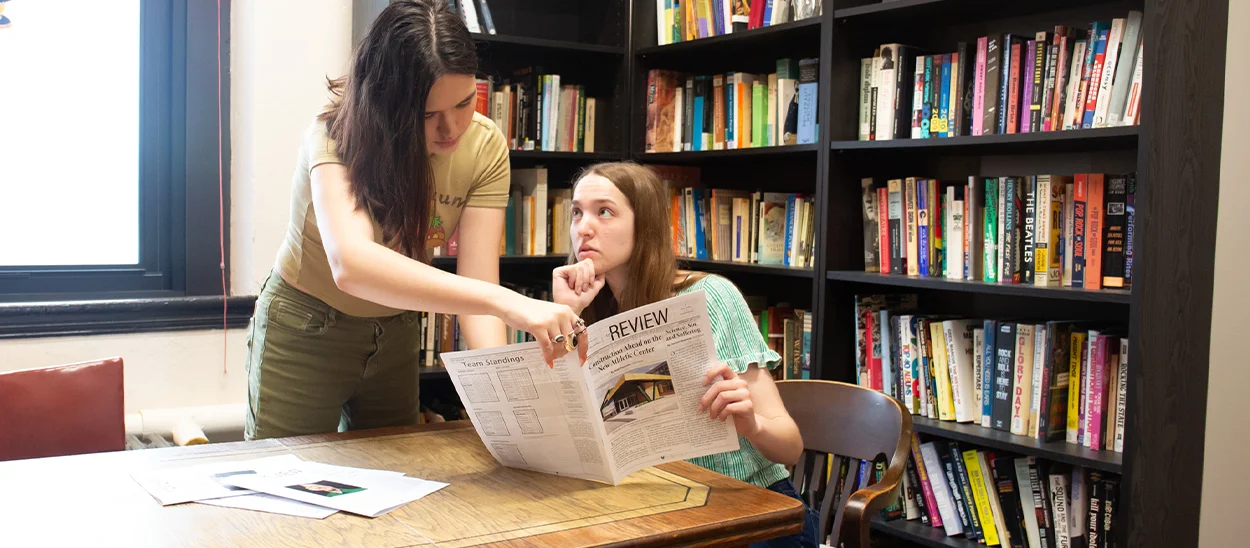
Internships and Work-Study
Students have opportunities to work at our small literary press, Eulalia Books, writing for the student newspaper The Review, editing our literary magazine Generation, and tutoring at the Writing Center.
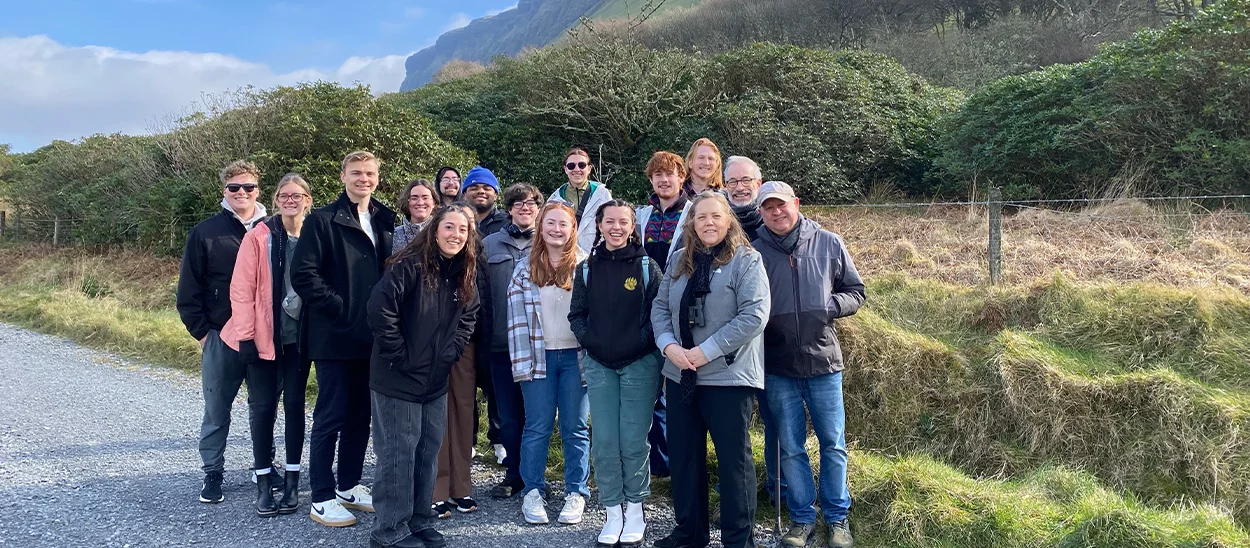
Travel Courses
Travel courses offered each spring enable students to see Shakespeare plays in London, listen to poetry in Dublin pubs, visit the homes of Dante and other writers, and see Paris from the expatriate perspective.
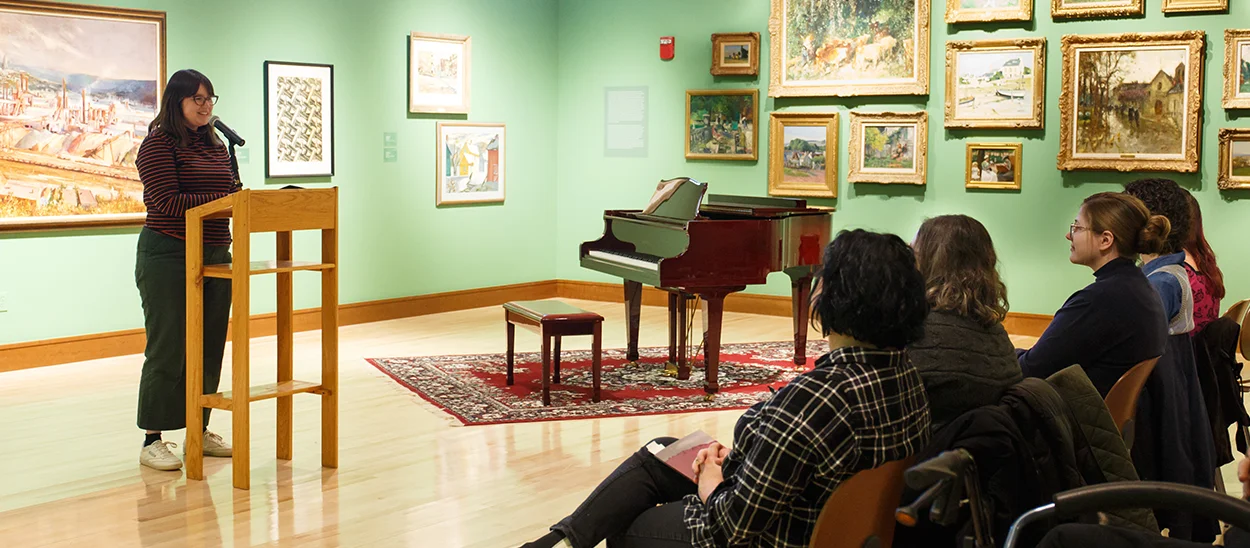
Eulalia Books
Students working with Eulalia Books will gain experience in manuscript acquisition, editing, and literary marketing. The press publishes two full-length books of international poetry in translation annually, along with letterpress chapbooks and broadsides. After taking the Small Press Publishing course, students can intern with the press for academic credit. Students can attend poetry and book readings throughout the semester engaging with published and award-winning authors and translators.
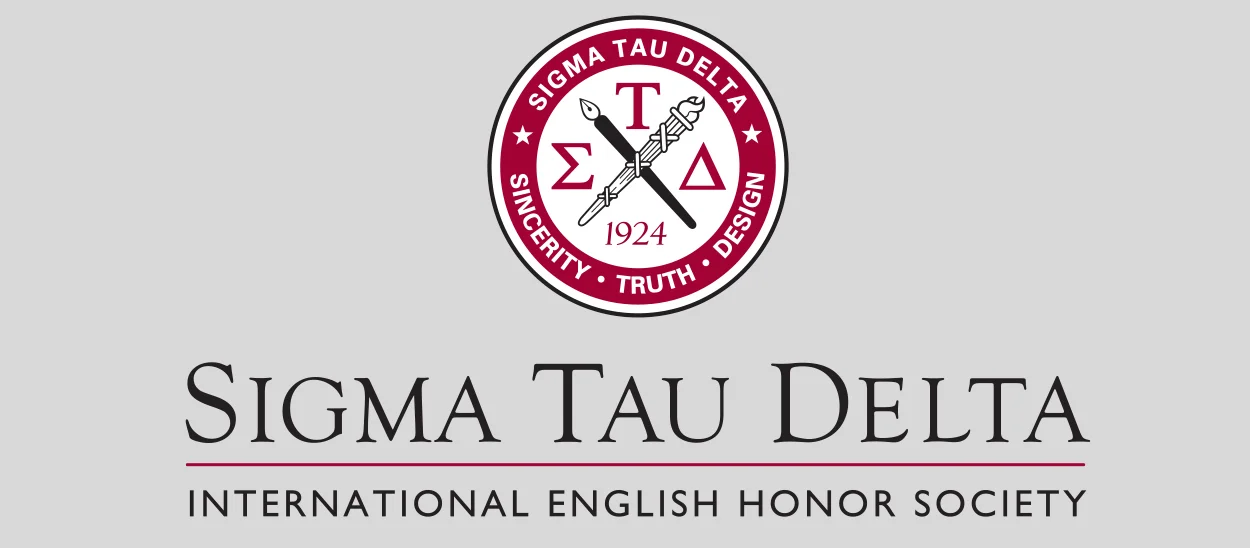
Sigma Tau Delta
Through our membership in Sigma Tau Delta, the national English Honors fraternity, students may present papers and creative work at the annual conference, for which students routinely earn Palumbo grants to fund their travel. Students can also work toward publishing academic and creative work in Sigma Tau Delta journals.
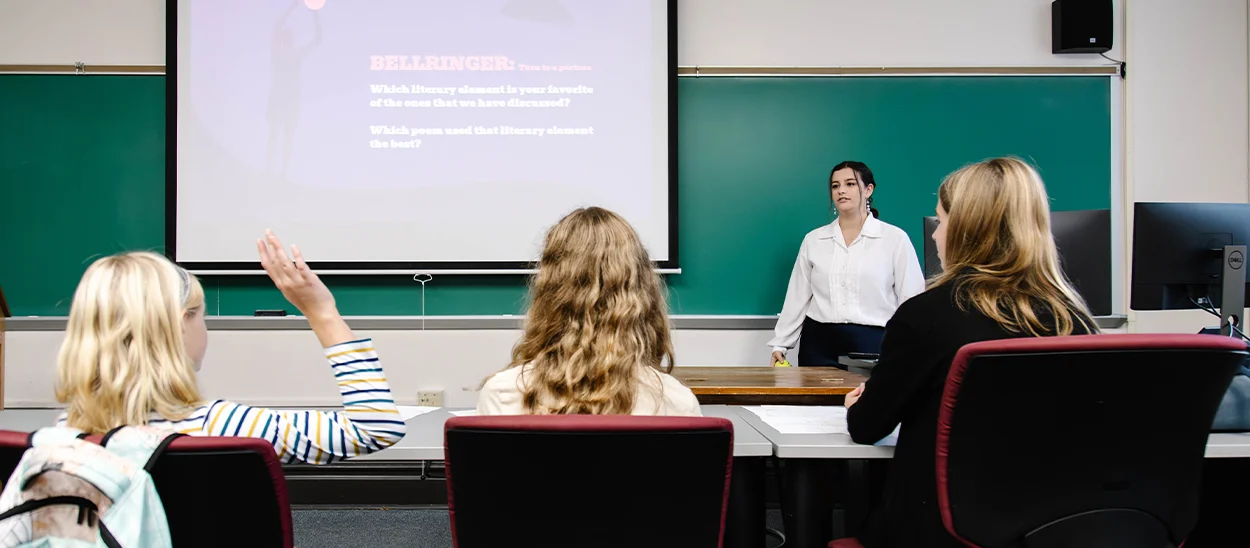
Classroom Experience for Future Teachers
Starting freshman year, English majors in the teaching certification track, engage in field experiences that integrate with their coursework allowing immediate application of educational theories. Opportunities include lesson planning for homeschooling students in our STEP-Up Enrichment program, immersive co-teaching, and a 14-week student teaching internship. Learn more details about our educational field experiences.
Careers After Saint Vincent
Our flexible degree allows students to choose their own path while equipping them with essential skills. Students interested in graduate school and academia can delve into advanced literature and theory courses. Pre-law students gain critical thinking skills for the LSAT and law school. Aspiring teachers can follow a certification track with our education department, preparing for the certification test and teaching careers. Student writers enhance their expository and creative writing skills for technical and professional writing careers. Those interested in publishing benefit from specialized coursework and internships.
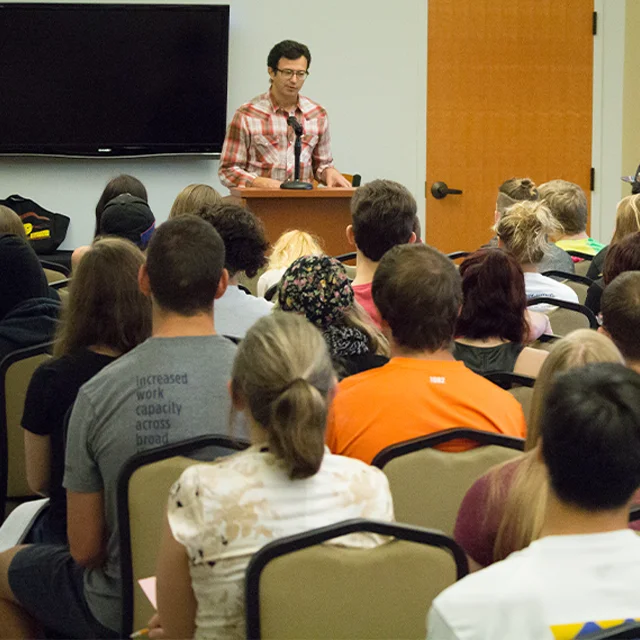
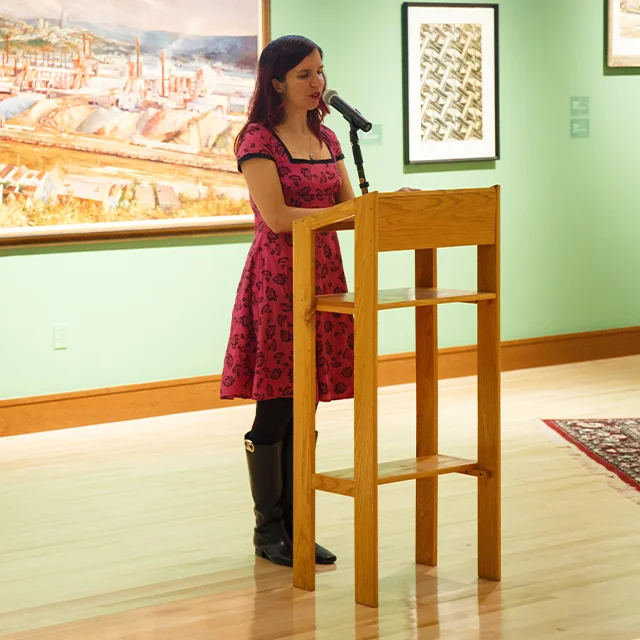
Our students have secured jobs and internships at a variety of companies in their field and enrolled in prestigious graduate schools:
Employers
- Liturgical Press
- The United Way
- Broadleaf Press
- Bechtel Corp.
- Amazon
- Westmoreland County District Attorney’s Office
- Juxtaproof Press (student start-up)
Faculty Positions:
- University of Arkansas
- St. Mary’s University
- University of Pittsburgh
- Naropa Institute
- Saint Vincent College
Graduate Schools:
- Columbia University
- Carnegie Mellon University
- University of Pittsburgh
- University of Iowa Writer’s Workshop
- University of Illinois
Law Schools:
- Georgetown
- Dickinson
- George Washington
- University of Pittsburgh
- Duquesne
Student Success Stories
-

Elizabeth Elin, C’23
“I am very appreciative of my time in the Saint Vincent English department, which gave me the foundation to be successful in my career in publishing. In my role at Liturgical Press and Give Us This Day, I used the skills that I learned in the English department every day. The Small Press Publishing course illuminated for me how a publishing career can also be an art form. In the two years that I spent interning for Eulalia Books, I gained hands-on experience in nearly every side of publishing, including editing, grant writing, and marketing and publicity. And as an editor for Generation, the English department's student literary magazine, I learned firsthand the book production process, from manuscript submission to print production to final copy. As a student at Princeton Theological Seminary, in the classroom, and in my thesis, I will use the writing, analytical and critical thinking, and research skills that I gained from my classes in the English department."
Editor at Liturgical Press and earning master's at Princeton Theological Seminary
-

Mallory Truckenmiller Saylor, C'19
“During my internship for Asymptote Book Club, I worked with an international team of editors and translators from various backgrounds while experiencing the complex, demanding, and overlapping responsibilities of managing a literary service. My responsibilities included promoting the book club through social media and literary communities, collaborating with the marketing team to devise strategies for incorporating the book club into educational environments, and reading unpublished translation manuscripts and writing reader’s reports. I learned how to communicate quickly and efficiently with an editorial team in order to ensure a smooth and successful operation within an ever-changing publishing environment. This internship reshaped my career path and shifted my attention to new literatures and languages.”
Director of the Saint Vincent College Writing Center
-

Angel Scalamogna, C’23, G’24
“My experience traveling to London through the Shakespeare in London course was nothing short of transformative. The course not only deepened my understanding of Shakespeare’s genius but also allowed me to immerse myself in the very places where his plays were performed and his words came to life. Walking the streets of the city, visiting the Globe Theatre, and standing before the majestic sites that shaped his world, I felt a profound connection to the literary history that continues to influence our culture today. London itself became an open classroom, where every corner seemed to tell a story — from the bustling streets to the cozy local pubs and famous landmarks such as The Tower of London and our day-trip to Stratford-upon-Avon.”
Curriculum Requirements
The English major is part of the School of Arts, Humanities, and Social Sciences and is supported by our core curriculum, where students delve into diverse academic subjects at both foundational and advanced levels to explore how different disciplines connect, fostering deeper self-understanding and proficiency in their chosen field of study. We offer a wide range of courses that feed curiosity, broaden perspectives, and prepare for careers.
-
Major - Required Courses
Major - 37 credits
Students majoring in English must complete the following requirements:
Take four introductory courses that must be completed by the end of the sophomore year:
- EL 103
- Choose 2 courses from EL 114, 115, 118, and 133
- One elective.
Take three intermediate courses:
- EL 200 Literary Theory
- EL 300 Junior Seminar
- One 200-level course of the student’s choice. (*Note: Teaching Certification Concentrators need EL 205: Advanced Writing for their Education minor.)
Take three concentration courses (see below). These courses do not fulfill introductory or intermediate course requirements.
Complete a Senior Project:
- Students will register for EL 400 or 401 and complete an analytic or creative capstone project by the end of the fall semester of their senior year.
Complete an Experiential Component (one credit total):
- Students must complete one credit through an external or internal internship (EL 550) and a zero-credit requirement of relevant travel (EL 551). The external (i.e., outside the department) internships must be credit-bearing and supervised by English Department faculty. Internships within the department (of at least one year’s duration) may include such roles as Eulalia Books Intern, Writing Center Associate or Consultant, staff member of The Review or Generation, or Departmental Administrative Assistant. The zero credit travel requirement may be fulfilled through study abroad, a travel course (like EL 165, 166, or 167), a conference trip, or a presentation at SVC’s Academic Conference.
-
Concentrations - Required Courses
By the end of their freshman year, English majors, in consultation with their English advisors, should choose one of the five following concentrations, each of which has required courses and experiential component recommendations:
Literature:
Required courses (in addition to the introductory and intermediate course required of all concentrations):
- One 100-level literature elective
- Two 200-level literature electives
Recommended experiential component:
- Internships: any internal or external internship
- Travel: Conference travel, travel course, or study abroad.
Teaching Certification:
Required Courses (in addition to the introductory and intermediate courses required of all concentrations; no exceptions):
- EL 119: History of the English Language
- Either EL 273: Representations of Children in Young Adult Literature or CL 129: Young Adult Fiction
- One Shakespeare course EL 214, 127, or 165
Recommended Experiential Components:
- Internship: Writing Center Writing consultant or associate (*EL 205: Advanced Writing prerequisite)
- Travel: Conference travel, travel course, or study abroad
Creative Writing:
Required Courses:
- EL 110: Introduction to Creative Writing
- Two of the following: EL 203: Poetry Workshop, EL 204: Fiction Workshop, EL 244: Creative Nonfiction Workshop
Recommended Experiential Components:
- Internship: Generation, Eulalia Books, The Review.
- Travel: Conference travel or study abroad
Publishing:
Required Courses:
- EL 142: Poetry in Public: Outreach and Curation in the Literary Arts
- EL 185: History of the Book
- EL 230: Small Press Publishing
Recommended Experiential Components:
- Internship: Eulalia Books, Generation, The Review
- Travel: Conference travel or study abroad
Literary Translation:
Required courses:
- EL 110: Intro to Creative Writing
- EL 252: Intro to Literary Translation Workshop
- EL 236: Modern European Literature or EL 250: Contemporary World Literatures in Translation
Recommended Experiential Components:
- Internship: Eulalia Books, off-campus internship
- Travel: Study abroad, conference presentation
Please note that this list of courses is subject to change; majors should consult the English Department’s Schoology page during each registration period for updates.
-
Minor - Required Courses
The minor in English offers a flexible program of study that allows students to build skills in writing, analytical reading, and critical thinking. This minor nurtures curiosity and fosters appreciation of literature, art, and culture. A minor in English communicates both technical and analytical competencies to future employers and graduate admissions counselors. Because it enhances intellect, conversational agility, and marketability, a minor in English complements any major.
Students seeking a minor in English must take:
- Either EL 200 or EL 205
- One 100-level EL course
- Three 200-level EL courses
- One core or interdisciplinary course upon approval
-
Key Courses
Environmental Literature: This course explores the connections between literature and the environment, covering nature writing, culture, animals, children’s literature, global warming, and post-apocalyptic environmental disasters. It includes short readings, novels, and various ecocritical and interdisciplinary perspectives.
Shakespeare’s London: A study-abroad course where students experience Shakespeare’s plays in London. Before traveling, students read the plays and share interpretations via blog posts. In London, they visit key sites, attend lectures, and watch performances at Shakespeare’s Globe and the Royal Shakespeare Company in Stratford-Upon-Avon.
Small Press Publishing: Provides hands-on experience in small press poetry publishing. Students collaborate with Eulalia Books, exploring independent publishing through readings, discussions, and workshops. They learn about the historical, aesthetic, ethical, and social aspects of publishing, as well as design and printing techniques for handmade books and digital formats.
Events
Eulalia Book Launch
Eulalia Books brings ex-centric, ecstatic poetries into English for the first time. This award-winning small press was founded by Michelle Gil-Montero and is supported by English faculty, alumni, and current student interns who curate, edit, market, and debut contemporary poetry from Latin America. Book launch events celebrate Saint Vincent College’s unique ability to publish poetry that brings the broader world close at hand.
Generation Magazine Launch
Established in 1962, Generation magazine celebrates creative writing and visual arts. Now open to alumni and pre-college students, Generation is compiled, designed, and distributed by current students. A launch party and reading are held each spring.
Ragan Poetry Contest and Reading
The Ragan Poetry Contest was established in 1995 through a generous gift from Dr. James Ragan, a 1966 graduate of Saint Vincent College and former Director of the University of Southern California’s Graduate Professional Writing Program. The award honors Dr. Ragan’s parents, John and Theresa Ragan, and is intended to encourage interest in poetry among Saint Vincent students. The reading features student recitations of winning poems, along with a reading by this year’s judge.
Scriptorium: A Literature Conference for High School Students
A scriptorium was a room in medieval monasteries where monks transcribed scripture into beautifully illuminated manuscripts. This conference invites local high school students to visit the Saint Vincent College campus and share their writing with fellow literature lovers at the oldest and largest monastery in the United States.
Facilities and Resources
-
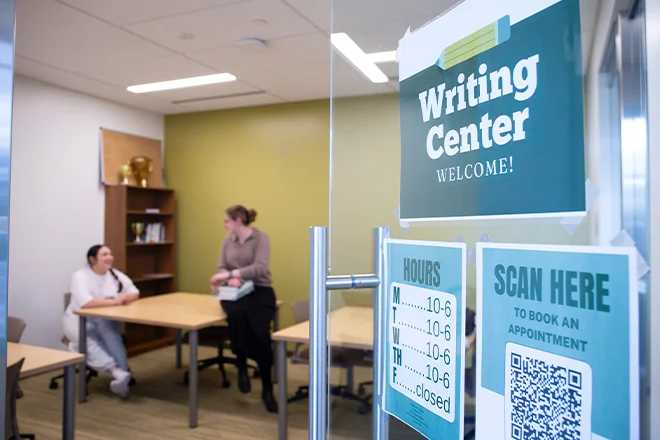
The Writing Center
The Saint Vincent College Writing Center helps students become confident, independent writers through personalized support at every stage of the writing process. Students can also become writing tutors, gaining valuable experience while assisting their peers. Rooted in Benedictine Hallmarks, the center fosters a welcoming and constructive environment that celebrates individuality and collaboration. -

Eulalia Books
Eulalia Books, an independent publisher supported by Saint Vincent College, offers a unique opportunity for English majors to engage with contemporary Latin American poetry. By publishing works that have not yet appeared in full-length English translations, Eulalia Books highlights the artistry of translators and fosters a discourse on translation and poetics. Students can gain hands-on experience in literary publishing, translation, and collaboration, making it an enriching addition to their academic journey. -
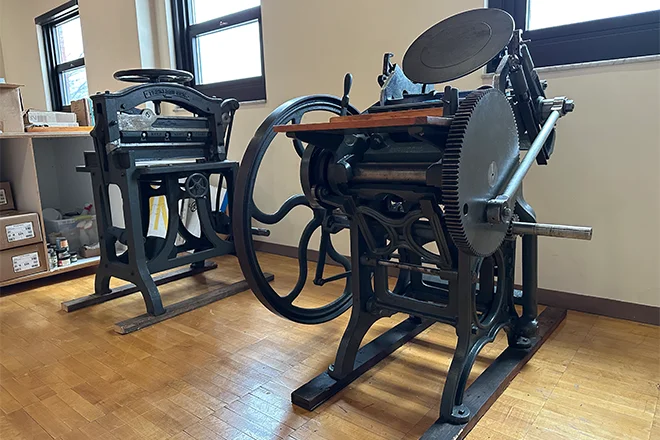
The Letterpress
Our working printing press, a Chandler and Price Old Style Press (circa 1892), is used in our Small Press Publishing course and for Eulalia Books. It brings to life small-run poetry chapbooks, broadsides, postcards, bookmarks, and other unique ephemera. Students have the opportunity to set type and designs, learning the art of inking and operating this historic letterpress.
Undergraduate Programs
Undergraduate Admission
Phone:
800-782-5549
Ext. 2500
Email:
admission@stvincent.edu
